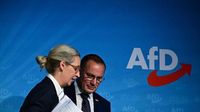Germany's internal security agency, the Verfassungsschutz, has classified the Alternative for Germany (AfD) party as a confirmed right-wing extremist organization, igniting fierce debate and calls for a potential ban on the party. This classification comes after a lengthy examination, which concluded that the AfD poses a threat to the democratic order and seeks to exclude certain population groups from equal participation.
Following this announcement, several alliances, including "Zusammen Gegen Rechts" and the campaign "Menschenwürde verteidigen - AfD-Verbot Jetzt!", have organized nationwide demonstrations set for May 11, 2025. These groups are urging the Bundestag, Bundesrat, and the future federal government to initiate a ban on the AfD immediately.
The classification has also raised international concerns, particularly from Ukraine. The Ukrainian Ambassador to Germany, Oleksii Makeiev, expressed his apprehension regarding the AfD's pro-Russia stance. He stated, "As the ambassador of Ukraine, I am concerned that the AfD does not clearly condemn the brutal Russian invasion and instead advocates for friendship with Russia. Russians are raping, torturing, and murdering. The AfD downplays, relativizes, and denies these actions." This sentiment underscores the international implications of the AfD's political positioning.
On the domestic front, reactions have been mixed. Sahra Wagenknecht, a prominent figure in the political landscape, criticized the classification, claiming it represents an "authoritarian transformation" of society. She accused the parties of the self-proclaimed "democratic center" of suppressing free speech and combating unwelcome political forces through undemocratic means.
Within the Union party, opinions are divided on how to respond to the AfD's new status. Marco Wanderwitz (CDU) described the classification as a "new situation" that necessitates action to "eliminate" the AfD. He is supported by Schleswig-Holstein's Minister President, Daniel Günther, who called for a swift ban procedure to protect democracy. Conversely, other members, such as Alexander Throm (CDU), urged for careful analysis of the implications of this classification.
In light of the classification, Hessen's Interior Minister Roman Poseck announced plans to examine the potential repercussions for AfD members in public service, emphasizing that public employees must uphold the democratic values of the state. Similarly, Bavaria's Interior Minister Joachim Herrmann stated that the consequences for AfD members in public service must be scrutinized.
However, not all political leaders agree on the necessity of a ban. Christian Dürr, a candidate for leadership in the Free Democratic Party (FDP), warned against pursuing a ban application at the Federal Constitutional Court, arguing that it could send a detrimental signal to voters who supported the AfD in the last federal elections.
The Foreign Office responded to criticism from US Secretary of State Marco Rubio, who accused Germany of tyranny following the AfD's classification. The Foreign Office stated, "That is democracy," emphasizing that the decision was the result of a thorough and independent investigation aimed at protecting the constitution and the rule of law.
In the wake of the classification, US Vice President JD Vance weighed in, stating that the AfD is the most popular party in Germany and represents East Germany's interests. He likened the current situation to the Berlin Wall, suggesting that bureaucrats are attempting to undermine the party.
Amidst these discussions, the AfD is mounting a legal challenge against the Verfassungsschutz classification. Party leaders Alice Weidel and Tino Chrupalla have labeled the classification as a heavy blow against German democracy, asserting that it is politically motivated and aims to discredit the party during a critical election period.
As the debate continues, the SPD's Ralf Stegner has called for a swift response to the classification, arguing that any form of normalization with the AfD has failed. He insists that all available constitutional measures must be utilized to combat the enemies of democracy.
Despite the overwhelming calls for a ban, outgoing Chancellor Olaf Scholz has urged caution, warning against a hasty decision. He highlighted the historical context of failed ban attempts against parties like the NPD, stating, "I am against a quick fix and will not suggest how we should proceed."
As discussions unfold, the upcoming Interior Ministers' Conference, scheduled for June 11-13, 2025, will further examine potential consequences of the AfD's classification, including the possibility of a ban. The conference will serve as a platform for evaluating the implications of the Verfassungsschutz's findings and determining the appropriate political response.
In the meantime, disciplinary proceedings are already in motion against at least 193 police officers across various federal states, suspected of holding right-wing extremist views. The classification of the AfD as a confirmed right-wing extremist organization has intensified scrutiny of its members, particularly those in public service roles.
The political landscape in Germany is shifting as the implications of the AfD's classification unfold. With calls for a ban gaining momentum, the coming weeks will be crucial in determining the future of the party and its influence on German politics.





